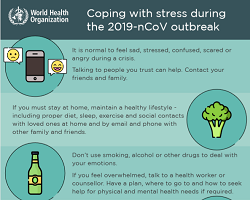Mental health and COVID-19

As the coronavirus pandemic rapidly sweeps across the world, it is inducing a considerable degree of fear, worry and concern in the population at large and among certain groups in particular, such as older adults, care providers and people with underlying health conditions.
In public mental health terms, the main psychological impact to date is elevated rates of stress or anxiety. But as new measures and impacts are introduced – especially quarantine and its effects on many people’s usual activities, routines or livelihoods – levels of loneliness, depression, harmful alcohol and drug use, and self-harm or suicidal behaviour are also expected to rise.
In populations already heavily affected, such as Lombardy in Italy, issues of service access and continuity for people with developing or existing mental health conditions are also now a major concern, along with the mental health and well-being of frontline workers.
As part of its public health response, WHO has worked with partners to develop a set of new materials on the mental health and psychosocial support aspects of COVID-19.



